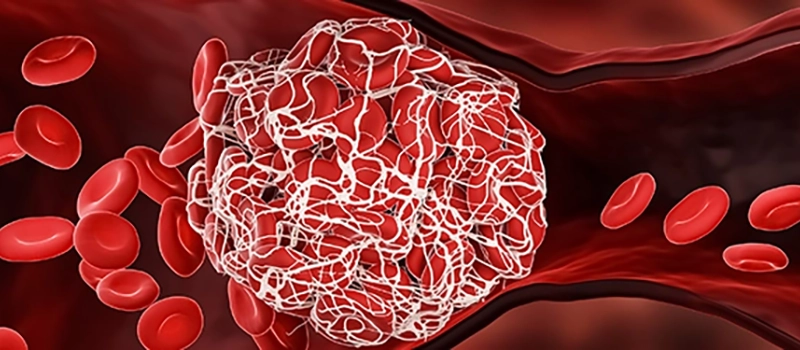
Humans build dams to restrict the flow of water, and primarily for the benefit of hydroelectricity. When it comes to humans themselves and all the blood flowing through them though, there’s not any benefit at all in having blood flow restricted in the body. In fact, blood clots are downright dangerous and can lead to heart attacks and strokes. Blood clotting is a good thing when you need a wound to stop bleeding, but when clots build up and move into arteries bad things can happen. There are different types of blood clots, and some will want to know which type of drug prevents or delays blood clotting.
The two types of blood clots are thrombus clots and embolus clots. Neither are desirable of course, but one type is a whole lot more potentially problematic than the other. Thrombus clots are stationary blood clots, meaning they don’t move but they can still impede blood flow. Embolus clots are always happy to pack a bag and hit the road, and this love of travelling makes them a whole lot more dangerous because if that clot travels to heart, lungs, or brains there’s the possibility of an embolism.
Drugs that prevent blood clots include Coumadin and Elmiron. Not only are these drugs effective against clotting with the way they’re formulated to disable the substances that form blood clots, but each is also available as a blood clot prevention drug in a generic, and this will be a relief for anyone who needs to be on blood thinner medication but needs a lower price on drugs and considering ordering medication online from Canada.
We’ll look at the types of blood clots in greater detail here, as well as talk a bit about what you can do differently to reduce the risk of blood clots and make sure there’s never any ‘dams’ being built in your arteries if that’s something that is a risk factor for you.
Not talking real estate or property here at all, but rather that the two different types of blood clots above are going to be very different depending on where they are located. As the name suggests venous clots are ones that form in your veins. Same thing for arterial clots because they form in your arteries. Arterial clots have the potential to be really harmful as it is these ones that cause stroke or heart attack. Venous clots are the less could-be-catastrophic of the two, but venous blood clots can cause deep vein thrombosis and a DVT that breaks free can lead to an embolism.
We also mentioned earlier that blood clotting is a good thing when you need a wound to stop leaking crimson. Vitamin K is never going to be one of the most championed vitamins, but Vitamin K is integral for forming blood clots and so when you see a wound finally stop bleeding you’ve seen K do its thing.
Apparently humans are getting much less Vitamin K from their diets these days, and that’s because of increasingly nutrient depleted soil nearly all over the world. Depleted soil has a very negative effect on the nutrient value of grown food, and should it be much more of a concern for us than it is. Less Vitamin K means less likelihood of blood clots, and some might think that’s a good thing if you’re taking blood thinner meds to prevent clots.
Not so – the types of people who will be prescribed Coumadin or Elmiron will be recovering from heart attack or heart valve replacement therapy and should be getting as much nutritional value from their diet, including full vitamin intake.
Blood clots are a part of women’s period too, and can also occur after types of minor surgery even. Plus being very overweight. For all these reasons and more it’s good to be proactive on your own to prevent blood clots naturally too.
No matter the type of blood clots, you can reduce the chance of developing them by:
Getting more physical exercise and maintaining a healthy body weight
Don’t smoke, and quit ASAP if you do
Find ways to alleviate stress
Increase foods with Omega 3 fatty acids and Vitamin E in your diet
Get more fruits, nuts, herbs, mushrooms, and legumes in your diet for their phytonutrient values
Use spices like turmeric and garlic in your cooking
Limit alcohol consumption
Blood clotting is a beneficial and needed bodily function, and it’s only certain types of blood clots that have the potential to be really harmful to your health if they’re on the move and making their way to somewhere they can block blood flow in a really bad way.